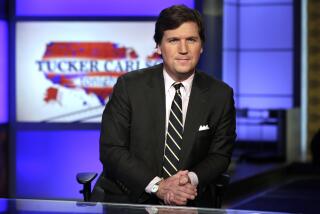TV Legislation Not Needed--Ex-CBS President
- Share via
NEW YORK — The former CBS Inc. president who proposed TV’s short-lived “family viewing hour” in 1975 doesn’t think new legislation aimed at voluntary curbs on the amount of sex and violence on TV is a good idea or a necessary one.
Arthur R. Taylor says he doesn’t like “government intervention of any kind,” even though recent bills passed by the House and Senate only would waive federal antitrust laws for three years to let the TV industry meet and draw up voluntary program standards.
“I think this is a private matter that should be handled within the industry,” said Taylor, president of CBS from 1972 to 1976. “It ought to be handled by industry deliberation and agreement.
“And any time the government gets involved--by an exemption or other measures--there is the possibility of a further use of government, and I’m not at all in favor of that.”
The recent legislation, which still faces a House-Senate conference to reconcile differences, is unnecessary, Taylor contends, “because there are, in my view, adequate provisions under the law for industry associations to operate. There is already an exemption under the antitrust laws for that.”
Taylor’s “family viewing hour” proposal was adopted by the networks and the National Assn. of Broadcasters in 1975 amid complaints about sex and violence on TV and after the Federal Communications Commission asked the networks to suggest ways TV violence might be curbed.
It was suspended in 1976 after court challenges over government meddling and was never revived. The association’s guideline had set aside the first hour of network prime time as a period when broadcasters shouldn’t air entertainment shows “inappropriate” for a general family audience.
Taylor, who now owns a company that buys and sells other companies and is dean of Fordham University’s graduate school of business here, once referred to the family viewing hour as a cordon sanitaire-- a buffer zone between stronger fare later at night.
He still believes it was a good idea, although “I think the boat has sailed by on that one” because now there is “a very high percentage of all age groups” watching TV at all hours of the day, not just at night.
But guidelines still are needed, he says, and he sees nothing wrong with them, “provided they’re freely entered into without coercion, and they give some kind of comfort to that portion of the American people that wants more middle-of-the-road fare.
“‘But I certainly would not exclude from those guidelines an opportunity to show a full range of fare, because the audience ranges in its appetites all the way from the aberrant to the very, very conservative.”
What might work now, Taylor suggests, is perhaps something similar to the Motion Picture Assn. of America’s movie rating code.
What he would like, he says, is an arrangement in which the broadcast and cable industries would give the public “advance notice as to what they can expect” in upcoming programs. That, he says, would allow viewers “to make independent decisions as to whether they wish to view (a given program) or . . . have their children view it.”
More to Read
The biggest entertainment stories
Get our big stories about Hollywood, film, television, music, arts, culture and more right in your inbox as soon as they publish.
You may occasionally receive promotional content from the Los Angeles Times.










